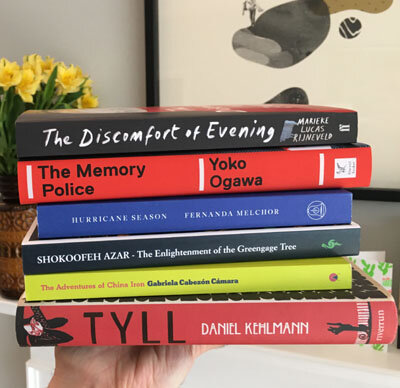The Booker International Prize has become one of my favourite literary awards to follow as it’s fascinating reading a wider variety of literature from around the world, it gives a much-needed platform for many independent publishers and, of course, the quality of the books chosen are often top notch. Last year’s winner “Celestial Bodies” was an excellent family saga about three very different sisters in modern-day Oman. I’ve had especially high hopes for this year’s award because it has such an excellent group of judges including Jennifer Croft, who translated previous winner “Flights” by Olga Tokarczuk; brilliant writer Valeria Luiselli whose most recent novel is the outstanding “Lost Children Archive” and the group is chaired by Ted Hodgkinson who is Head of Literature at the Southbank Centre in London which hosts discussions with many writers from around the world.
So I trust their taste and it’s a thrill to see these 13 novels which they’ve selected for this year’s longlist. I’m especially happy “The Memory Police” and “Hurricane Season” are listed as I think they’re both fascinatingly inventive novels with brilliant story-telling. I’m also very glad “The Eighth Life” has been included. This is a sweeping family epic set over a century in Georgia and is by far the longest novel on the list at 944 pages. Now, I guiltily have to admit, that because of the length this was a novel I started last Autumn but paused reading after around 200 pages. I was really enjoying it but because I try to read other books while reading such a long novel I let myself get distracted and didn’t go back. I’m looking forward to returning to it with vigour now to read it in its entirety.
Out of the remaining titles some that I’m most looking forward to are “Little Eyes” by Samanta Schweblin (which I included in a video list of my most anticipated books of the year.) Schweblin was previously listed for the Booker Prize with her creepily surreal short novel “Fever Dream”. I’ll probably also prioritize reading “The Enlightenment of the Greengage Tree”, “The Adventure of China Iron”, “Tyll”, “Faces on the Tip of my Tongue” and “The Discomfort of Evening”. But I’d be curious to read all the novels – except perhaps “Serotonin” as I’m not sure Houllebecq will be an author I enjoy. If you think I should give him a try let me know.
Two of the novels haven’t yet been published in the UK: “Little Eyes” is due to be published on April 16 and “The Discomfort of Evening” is due to be published on March 19. When this occurred last year the publishers rushed them to print so that may happen again (especially because Schweblin’s novel currently won’t be available until after the shortlist is announced).
I’m sure many people will note that this year’s list (yet again) has a very European focus with 7 titles nominated. I’m not sure why this would be, but I’m guessing that more translated books from the continent get published in the UK leading to lists which lean more in Europe’s favour. However, it should be noted that nearly half the list comes from countries around the rest of the world. This is also the year that Great Britain is officially leaving the European Union so perhaps the judges are making a point that we’re still culturally connected to the continent.










